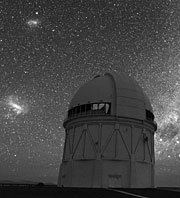The Rarity of a Starlit Sky
Suzie Lechtenberg
MARCH 29, 2008
- An observatory in Chile illuminated by stars
- (Roger Smith/AURA/NOAO/NSF)
- Enlarge This Image
Web Resources
More From Suzie Lechtenberg
Bill Radke: Why does a dark night sky mean so much to you?
Bob Gent: I moved to Phoenix, Ariz., when I was a baby, my parents moved out there. And I remember in the early years growing up, walking into the back yard, and looking up at a beautiful night sky. It was full of thousands and thousands of stars. The Milky Way was visible, galaxies and clusters were visible. So it was really a fascinating time to grow up in Phoenix. But at night when I went out and saw all of those stars, I was immediately inspired, and I had so many questions. How far away are those stars? What are they made of? Can we visit them? Is there a last star? Well that is a very humbling experience to realize the vastness of the universe, and that we are just one little tiny point here on a pale blue dot here on earth. And so, from those early years, I was always inspired to study the night sky.
I bring my daughter out regularly to the back yard and we look at the stars and the moon, but we don't have anything like that vision that you just described.
Unfortunately, all over the world, everywhere, all the cities are getting bigger and brighter. I lived in 11 years in the Washington, D.C. metro area, we were lucky to see five or six stars sometimes because the sky was so bright. Just a bright orange glow, and you couldn't see through it to see the stars. So to me, it's a tragedy that we are losing touch with the night sky. But not only that, we're also wasting an enormous amount of energy to destroy the night skies, and we are also disorienting wildlife -- migrating birds, sea turtles, and other species.
You know Bob, I've actually been embarrassed since my family moved into our house that I still haven't put up any lights outside. The neighbors call us the "dark house." What if darkness feels unwelcoming?
You know, when I was a boy, I was afraid of the dark, and there were times when my mother had to leave the bedroom lights on. Then she'd come back and turn the lights off when I fell asleep. We all fear darkness, but what I like to say is, you know, criminals could fear darkness too. And I think criminals might need lights to see to commit crimes. So just being under a bright glare of a light, may not be what you need to be safe.
Why do you think that sight that you described of that dark night sky, why does it affect us? Why does it affect you so deeply?
It's an inspiration. It stimulates the imagination. It stimulated scientists, poets, writers, for thousands of years. In the Middle Ages imagine, people would walk around with something called an astroladb in their pocket, and they could pull this out, look at the night sky and figure out time and other information about the night sky. Well, we've lost touch with all of that. But also, it's a humbling experience, to look at a night sky, filled with thousands of stars, and to wonder, "How big is the universe?" And to feel that it is unbounded. And that's something that I think is a real tragedy, the fact that we are losing touch with that.
National Dark Sky Week begins this weekend. Bob Gent, what a pleasure, thank you.
You're most welcome, thank you very much.
-
- Music Bridge:
- S'albufera
- Artist: Kamikaze Ground Crew
- CD: Postcards From the Highwire (Busmeat)







Comments
Comment | Refresh
From Chesterfield, MO, 03/30/2008
Bob Gent expresses the sentiments of many of us who love the night sky clear and void of manmade lights. I wish everyone would join an astronomy club to learn to appreciate the darkness. If you go out at night, you can carry a flashlight with a red piece of cellophane covering the light.
Post a Comment: Please be civil, brief and relevant.
Email addresses are never displayed, but they are required to confirm your comments. All comments are moderated. Weekend America reserves the right to edit any comments on this site and to read them on the air if they are extra-interesting. Please read the Comment Guidelines before posting.
You must be 13 or over to submit information to American Public Media. The information entered into this form will not be used to send unsolicited email and will not be sold to a third party. For more information see Terms and Conditions and Privacy Policy.